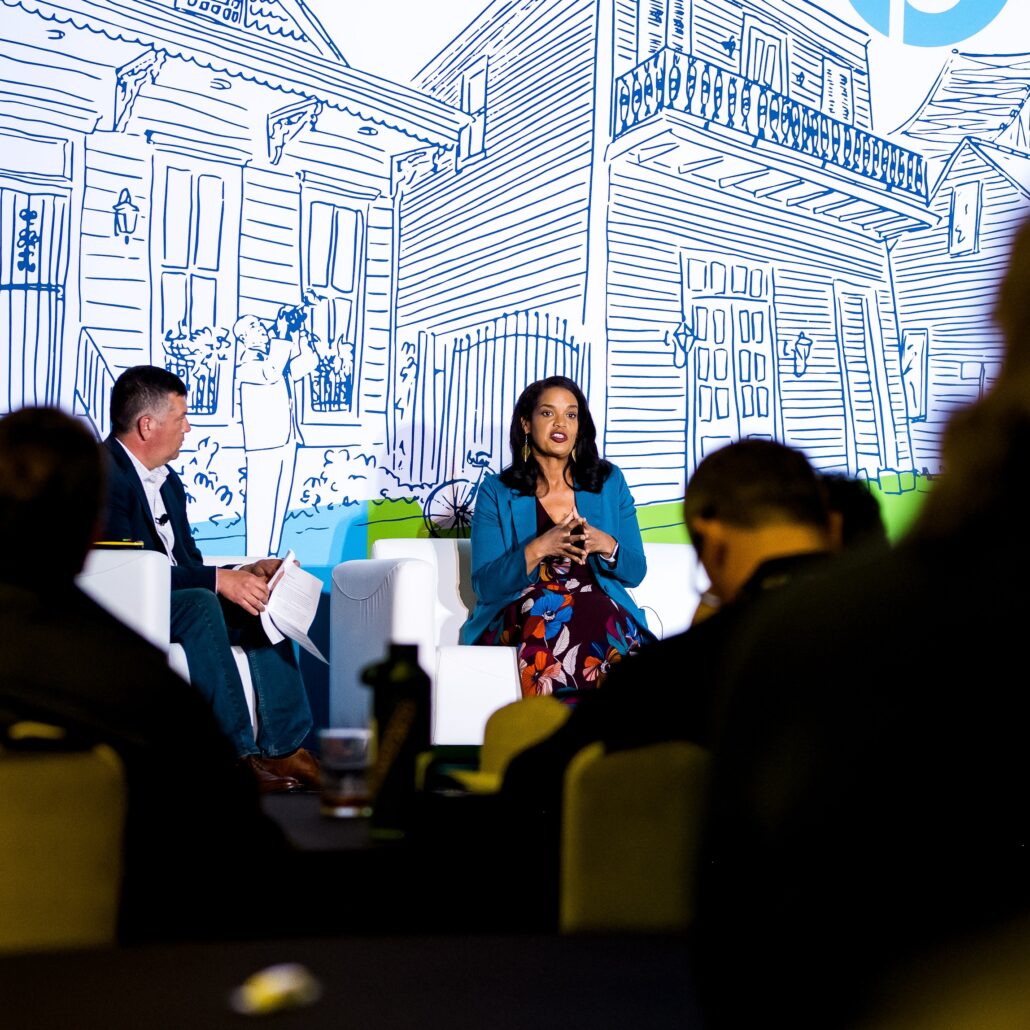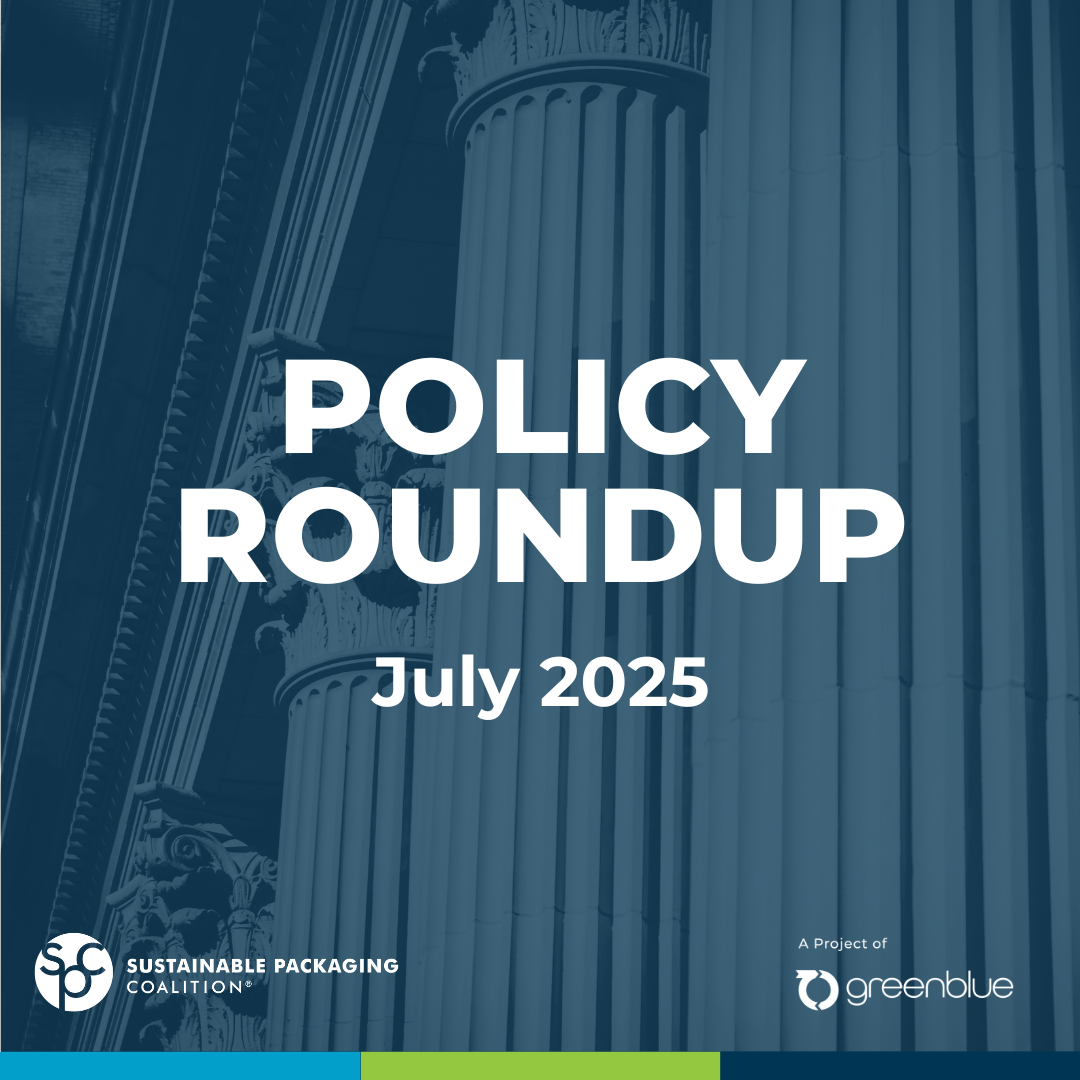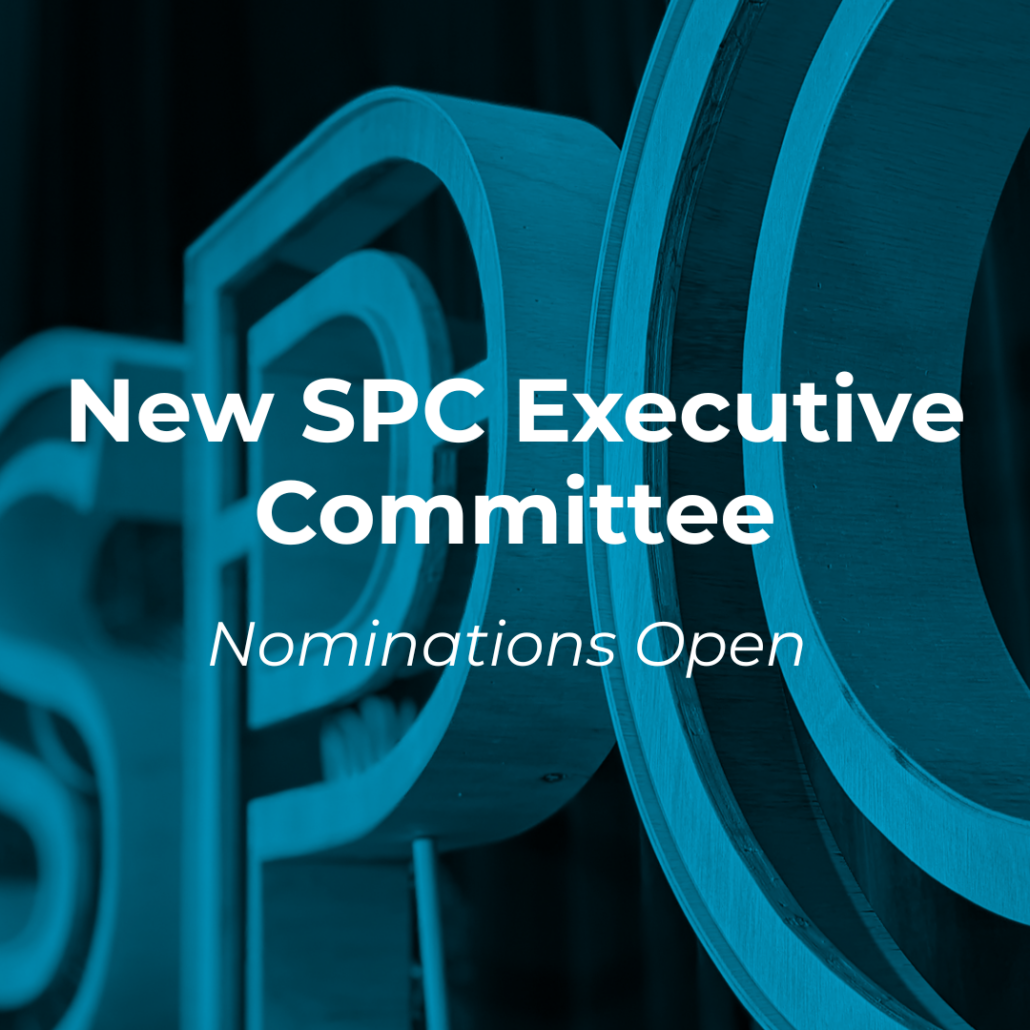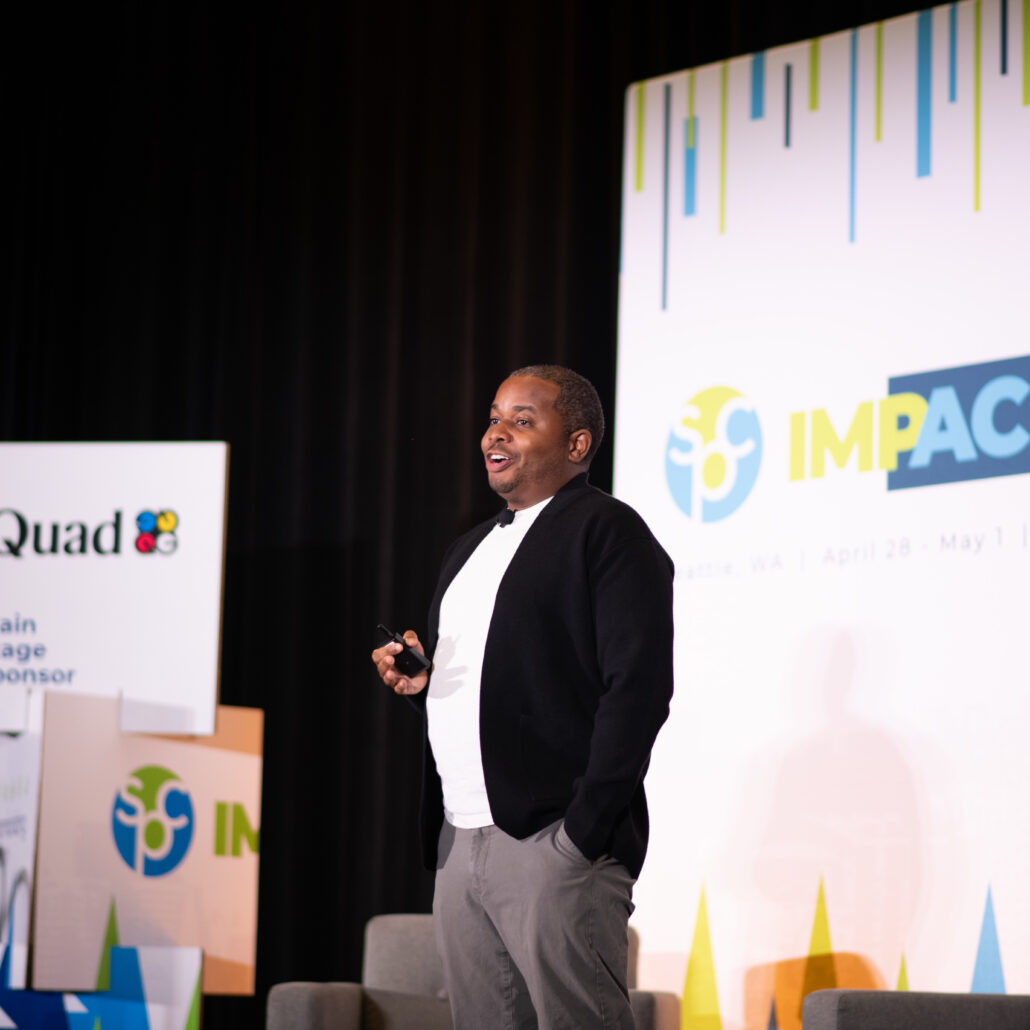The people of New Orleans are on the frontlines of everything from climate change to cancer-causing pollution, but still, they’re incredibly resilient. This year for SPC Impact we decided to go to New Orleans—to listen and learn from the people strengthening their communities in the face of climate and environmental catastrophes.
While we were there, we gained a deeper understanding of New Orleans’ legacy of resilience. We saw it after Katrina, when communities built back after one of the deadliest and the most costly hurricane in the country’s history. We saw it in places like Cancer Alley, where descendants of enslaved communities now face alarming cancer rates after nearby plantations turned into polluting petrochemical plants.
But we also saw that resilience doesn’t capture the full story for the people of New Orleans—because resilience is reactive. The people are proactively strengthening their communities, they’re advancing New Orleans’ environmental action by addressing the crises of waste, plastic manufacturing, and climate change head-on.
At SPC Impact this year, the GreenBlue team along with 800+ member companies and attendees heard from The Descendants Project Co-Founder Jo Banner, a representative from the City of New Orleans, and the people behind the Recycle Dat project. Together, we learned about New Orleans’ environmental action and proactive approach for addressing climate challenges.
Their secret? They’re involving the community, seeking out difficult answers, and treating the issues—and solutions—as interconnected. Along the way, they never lose sight of the joy in their communities. Let’s dive into three lessons in action from the people of New Orleans.
Lesson 1: Involve the community in the response
New Orleans and Mardi Gras are inseparable—the two go together like red beans and rice. And for all the color and joy of the parade, Mardi Gras isn’t really a holiday about consuming in moderation.
In Mardi Gras’ past, the success of the festival was judged by how much trash was landfilled. Beads and trash would block storm drains, and flooding forced people to move their cars to higher ground. In 2021, the parade generated 2.5 million pounds of waste that was landfilled in just 11 days.
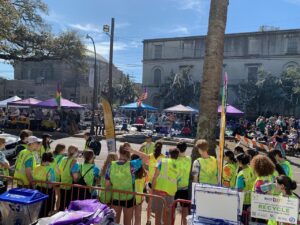
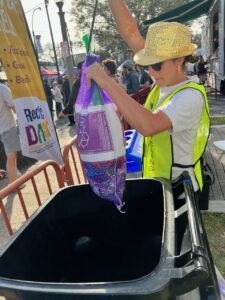
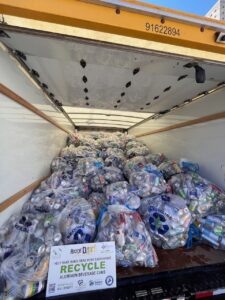
Photos: Grounds Krewe
Then in 2023, an initiative called “Recycle Dat” began to switch the script and encourage recycling over landfilling. At SPC Impact, we learned about the initiative’s ability to turn a massive waste event into a recycling triumph by driving collaboration across industry, nonprofits, and government while putting the community itself in the driver seat.
During a panel discussion featuring Brett Davis of Grounds Krewe, Kevin Ferguson of New Orleans & Company, Anna Nguyen of NOLA Ready, and Scott Breen of the Can Manufacturers Institute, panelists shared the sweeping success of the two-year-old initiative.
In 2023, for the first time, they strategically placed recycling hubs, dedicated can-only receptacles along the parade route, and had volunteers equipped with “Every Can Counts” backpacks walk around the parade. In the initiative’s first year, they collected an astonishing 150,000 aluminum cans that would have likely been otherwise landfilled.
Anna Nguyen said, “It’s not just one method that works, it’s a whole toolbox.”
We loved learning how Recycle Dat brought together industry, nonprofits, and local government to advance New Orleans’ environmental action. And they did it while empowering the people of New Orleans—the parade goers—to easily participate in the effort.
Lesson 2: “Strive for the answers that you might not want to hear”
They say that the first step in addressing a problem is identifying it. At Impact this year, Jo Banner shed insight on how we as a packaging industry can better identify the problems we need to address.
Banner co-founded The Descendants Project with her twin sister Dr. Joy Banner to advocate for the Louisiana river parish communities that lie at the intersection of slavery and environmental degradation. Their community sits on land that’s transitioned from plantation to petrochemical plant—and each generation of her community has suffered the consequences of those industries.
Today, the descendants of the enslaved communities live in what’s been known as “Cancer Alley” since the 1980s. Because of the petrochemical production that takes place sometimes within feet of their homes, the community faces health problems from the cradle to the grave: Low birth weight occurrences are more than three times above the national average and parts of the community have some of the highest cancer risk rates in the country.
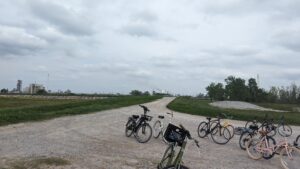
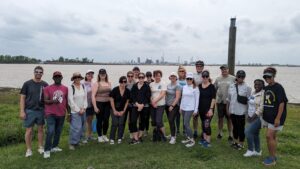
In her discussion with GreenBlue’s Tom Pollock, Banner gave several key insights into organizing and mobilizing to advance New Orleans’ environmental action while rectifying racial injustice. One key piece of advice she gave was to strive for answers that you might not want to hear. And when Tom asked Banner about plastic recycling, she showed us the power of that advice:
“For our community, recycling is not a solution. It keeps the production of plastic ongoing and releases toxins. Recycling means that we get to die from the problem and we get to die from the solution.”
In her conversation with Tom, Banner didn’t just challenge the recycling system though—she found common ground. She called attention to her own connections to the petrochemical production—how members of her family had worked for these plants. She rejected the argument that there were “sides” on these issues. “We’re not on a side … There’s no side in this but the healthy side … And right now, we’re the canary in the coal mine. Soon, Cancer Alley could be Cancer Valley and then Cancer Planet.”
Jo shared difficult truths, but she didn’t stop there. She shed light on the purpose of doing so: “If we don’t stare at the problem and address it, we can’t move forward.”
So, in following with Jo’s advice, we’ll strive for the answers we might not want to hear. “They will be so important for informing your decisions.”
Lesson 3: These issues transcend communities—and their solutions should, too
Seeking difficult answers means thinking realistically about the trajectory of climate change and the vulnerability of frontline communities, like New Orleans.
New Orleans is no stranger to extreme weather. In the years since Katrina, more than 25 hurricanes or tropical storms have made landfall in Louisiana. The number of excessive heat days is on the rise and, when it comes to coastal erosion, approximately one football field’s worth of wetlands vanishes into open water every hour.
A representative from the City of New Orleans’ Resilience & Sustainability office Daniel Jatres sat down at SPC Impact with GreenBlue’s Paul Nowak. Together, they talked about New Orleans’ environmental action as well as the looming threats of climate change in and beyond his community.
“Resilience is in the title of our climate action plan, but we’ve taken a proactive role in the last few years to grow. Our focus and our calling is not just to get resources for the city itself, but for the geographic area… Coastal land loss doesn’t care about jurisdictional boundaries.”At SPC Impact, we learned how the city’s Resilience & Sustainability office sees the issues of climate change, carbon emissions, coastal erosion—and more—as interconnected. And that interconnection has informed the shape of their response. They’re not just committed to reaching net zero by 2050, but they’re also leading initiatives to divest from fossil fuels, build green infrastructure, improve the city’s storm surge barrier, accelerate coastal restoration, and more. By engaging in these efforts, we learned more about the valuable lesson of looking to improve environmental outcomes in, around, and far beyond our own communities.
By MK Moore, GreenBlue Communications, Content & Design Manager


